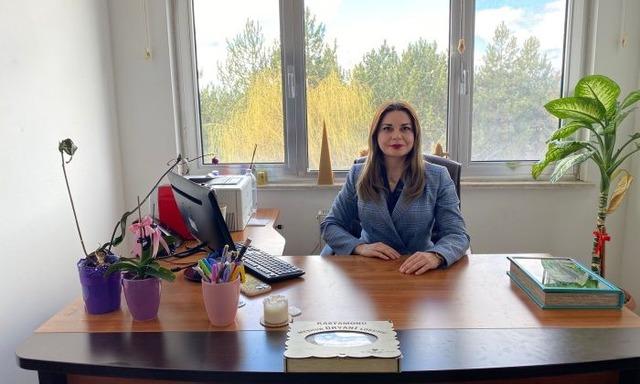As the month of Ramadan continues unabated, the issues that need to be taken into consideration in terms of health in this month are shared. Kastamonu University, Faculty of Tourism, Department of Gastronomy and Culinary Arts, Dr. Lecturer Elif Zeynep Özer gave information about the issues to be considered in nutrition during Ramadan. Stating that fasting during Ramadan allows the cleaning of toxins in the body, Özer pointed out that sahur is an important food. Pointing out that one should not sleep immediately after sahur, Özer noted that after iftar, after drinking soup, one should wait a few minutes and eat the main meal after the break.
“RAMADAN RENEWS A PERSON’S BODY”
Stating that there is no obstacle to healthy eating during Ramadan, he said, “On the contrary, healthy eating is possible especially during Ramadan. Because it is very difficult to eliminate all the food we eat for 11 months from the body. It helps cleanse the body of toxins accumulated in the body due to long-term ‘hunger’ during Ramadan fasting and supports the renewal of the human body. “Fasting can be thought of as a system created to ensure that the current health status of a person, resulting from his eating habits, can improve his well-being,” he said.
“WE SHOULD BE CAREFUL ABOUT COFFEE AND TEA CONSUMPTION IN TERMS OF THE BODY’S WATER BALANCE.”

Giving examples of foods that should be avoided while fasting, Özer said, “Ramadan has the philosophy of staying away from extremes and exaggerations. Excess in every sense harms people. The situation is the same with food; for example, if a food known to be the healthiest is consumed in excess, this food will begin to harm the person over time. During Ramadan, especially if simple carbohydrates are the first nutrients in a stomach that has been starving for a long time, we cannot talk about healthy nutrition here. Care should be taken not to consume too much simple carbohydrates, especially during Ramadan. As foods containing simple carbohydrates; We can talk about bakery products such as granulated sugar, candied corn, and white bread. Apart from these, excessive salty foods should be avoided, especially during Ramadan, as they will retain water in the body and cause the person to need water. “Coffee and tea consumption should also be taken into consideration in terms of the body’s water balance,” he said.
“ESPECIALLY WOMEN SHOULD MAKE SAHUR”

Giving advice to women about having sahur, Özer said, “Sahur is important while fasting, but it is not indispensable. As the month of Ramadan changes every year, the fasting processes that come with it also change. I especially recommend women to have sahur in order to maintain the hormonal balance in cases of hunger of 16 hours or more. One of the biggest mistakes made during Ramadan is to consume water in large sips at a time in order to complete the daily water consumption after iftar. Completing the daily amount of water required by sipping sips will provide the desired benefit. It should not be forgotten that water drunk quickly is eliminated from the body quickly, while water consumed slowly/sip by sip is eliminated from the body more slowly. In order not to suffer from excessive thirst and to maintain the necessary mineral balance, I recommend drinking soda and tamarind sherbet (from the Ottoman Palace Cuisine). If the person does not have a stomach problem, it is beneficial to add lemon and a small amount of salt to the soda. If the person has a stomach problem, the person can drink soda by mixing it with water or prefer high mineral water. “Water consumption is very important in order to avoid intense headaches during Ramadan,” he said.
“IF YOU SLEEP IMMEDIATELY AFTER SAHUR, THERE WILL BE TIRED ORGANS.”

Stating that processed foods should be avoided for sahur, Özer said, “Vegetable-rich eggs (boiled, omelet, etc.), cheese and low-salt olives can be preferred. Fruit can be consumed if desired; However, it should be known that it will affect hunger since it contains sugar. Processed foods such as salami, soudjouk and sausage should not be consumed and high sugar foods should be avoided. We should keep unnatural foods out of our preference list. In the body’s own system, organs are constantly working. While a person’s organs work more slowly when he sleeps, allowing him to rest, if he consumes food and drink at sahur and sleeps immediately afterwards, his organs will become tired. “At best, you should sleep at least an hour after eating,” he said.
“PROCESSED FOODS SHOULD BE STAYED AWAY”

Stating that those with gluten sensitivity are very lucky in Ramadan, Özer said, “One of the well-known mistakes in healthy nutrition is the idea that if we eat bakery products (for example, bread), we will be full. Since those who eat gluten-free already have a flour-free diet, they will be able to spend the month of Ramadan comfortably by maintaining their current healthy diet. Healthy “If they eat vegetable dishes and protein-rich foods in their nutritional routine, they will not feel intense hunger. The most important thing to pay attention to during Ramadan and outside of Ramadan is to stay away from processed foods. This also applies to people who do not have food allergies.”
(UAV)
